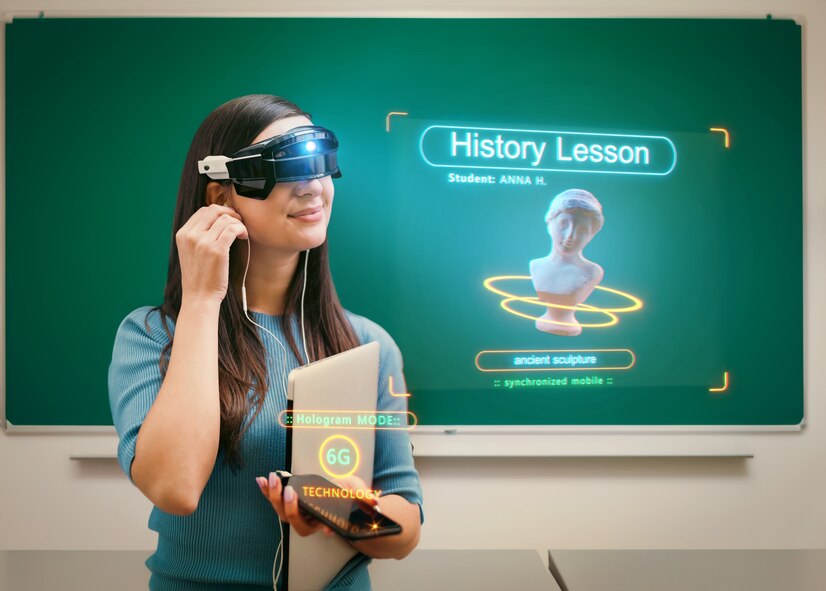Is there an impact of AI on education? Well, artificial Intelligence (AI) is revolutionizing so many fields around us. Same is in the case of education, AI is making a transformative impact on the field of education.
The Transformative Impact of Artificial Intelligence (AI) on Education
In the ever-evolving landscape of education, Artificial Intelligence (AI) emerges as a powerful force, reshaping traditional teaching and learning paradigms. From personalized learning experiences to administrative efficiency, AI holds immense promise for revolutionizing and improving education.
Let’s delve into the multifaceted impact of AI in educational contexts:
1. Personalized Learning
Artificial Intelligence (AI) is transforming the educational landscape by enabling personalized learning. AI-powered systems can analyze a student’s learning style, strengths, and weaknesses to tailor educational content and teaching methods. This personalization enhances the learning experience, making it more engaging and effective.
Customization: AI algorithms analyze student data, learning patterns, and preferences. This enables the creation of tailored learning paths that adapt to individual needs. Whether it’s adjusting the pace of instruction or suggesting relevant resources, AI ensures that no two learners follow identical trajectories.
Adaptive Assessment: AI-powered assessments dynamically adjust difficulty levels based on student performance. This ensures that learners are challenged appropriately and receive timely feedback. Gone are the days of one-size-fits-all exams; AI promotes fairness and accuracy which is a really good impact of AI on education. And when AI provides real-time feedback, it helps students understand their progress and areas for improvement right away. This immediate feedback is crucial in maintaining student engagement and motivation.
However, this also raises ethical and privacy concerns. It’s important to ensure that AI systems are transparent, fair, and respect user privacy.
2. Intelligent Tutoring Systems
24/7 Support: AI tutors are available round the clock. They patiently answer queries, explain concepts, and guide students through challenging topics. Whether it’s math, language, or science, these digital mentors enhance learning continuity.
Feedback and Remediation: AI analyzes student submissions, identifying misconceptions and areas for improvement. It provides instant feedback and suggests targeted remedial exercises. Students benefit from real-time guidance, fostering deeper understanding.
3. Administrative Efficiency
Automated Grading: AI streamlines the grading process. It evaluates assignments, quizzes, and essays, freeing educators from repetitive tasks. Teachers can focus on meaningful interactions with students.
Resource Allocation: AI optimizes resource allocation—whether it’s allocating classroom space, scheduling courses, or managing budgets. Educational institutions operate more efficiently, maximizing their impact.
4. Data-Driven Decision Making in Education
Predictive Analytics: AI analyzes historical data to predict student outcomes. Early warning systems flag at-risk students, allowing timely interventions. Educators can proactively address challenges and prevent academic setbacks.
Curriculum Enhancement: AI identifies gaps in curricula, suggesting relevant content and learning materials. It ensures that courses remain relevant and aligned with industry trends.
5. Lifelong Learning and Upskilling
Continuous Learning: AI facilitates lifelong learning. It recommends personalized courses, certifications, and skill-building opportunities. Professionals can upskill and adapt to changing job markets.
Career Guidance: AI assesses individual strengths, interests, and market demand. It guides students toward career paths that align with their aspirations and abilities.
6. Ethical Considerations
Bias Mitigation: While AI offers immense potential, we must address biases. Developers must ensure fairness, transparency, and ethical use. AI should not perpetuate existing inequalities.
Privacy and Security: Protecting student data is paramount. Striking a balance between personalized learning and privacy rights is crucial.
In conclusion, we can witness the impact of AI on education.. but AI isn’t replacing educators; it’s empowering them. As we embrace AI’s transformative role, let’s prioritize equity, ethics, and student well-being. Education, augmented by AI, becomes a dynamic journey—one where every learner thrives.




